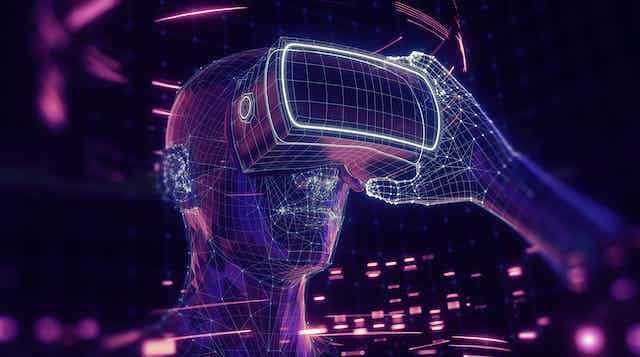or call: +1 (520) 350-7212
or call: +1 (520) 350-7212
metaverse
Think beyond the internet
One of the most highly anticipated technology evolutions of the coming decade
Metaverse - A Multifaceted Canvas of Technological Innovation
The Metaverse is not just a captivating vision of future interaction; it’s a rapidly evolving technological landscape bursting with investment potential.
The Metaverse is often envisioned as a convergence of technologies like VR, AR, AI, and blockchain, creating a single, immersive virtual reality. Imagine a persistent, interconnected 3D world where users transcend physical limitations, fostering groundbreaking experiences across virtually every domain. This nascent technology promises to revolutionize sectors like gaming, social interaction, commerce, education, and even work, presenting astute investors with unparalleled opportunities.
The Metaverse is fueled by a dynamic symphony of cutting-edge technologies. Virtual reality (VR) and augmented reality (AR) provide immersive experiences, blurring the lines between real and virtual. Blockchain and cryptocurrencies facilitate secure, frictionless digital ownership and transactions. Artificial intelligence (AI) powers intelligent avatars, personalized interactions, and dynamic environments. This potent synergy lays the foundation for a boundless innovation engine.
Each of these domains within the Metaverse offers distinct investment opportunities. From creating captivating VR experiences and developing social platforms to enabling seamless in-world commerce and powering innovative educational tools, the possibilities are endless. Visionary investors can be at the forefront of shaping this emerging landscape, reaping the rewards as these sectors mature and transform our world.
Metaverse - Key influencing areas
Virtual Experiences
While gaming currently dominates, opportunities in immersive fitness and entertainment are emerging. Innovative enterprise applications are also on the rise, particularly in collaboration, productivity, digital marketing, employee training, education, and healthcare.
App Stores and Operating Systems
The role of app stores is critical in the metaverse’s initial stages, providing users with curated, high-quality experiences to enhance engagement with the platform and associated headsets.
Devices
Overcoming technological barriers is crucial for the development of comfortable standalone devices offering truly immersive experiences. Achieving mass adoption requires metaverse content compatibility across various devices, including personal computers, gaming consoles, and smartphones.
Computing and Infrastructure
Hardware companies face the challenge of developing high-performance chips, servers, and networking technologies to deliver high-quality graphics and minimize latency.
Content-Creation Tools
A growing array of software tools is facilitating the creation of metaverse worlds and experiences, offering users building blocks, editing platforms, and interfaces to generate content easily.
Do we require the Metaverse?
Countless companies and investors have invested significant resources in the development of technologies constituting the metaverse. But what drives this substantial commitment when the metaverse is not fully realized? Let’s find out.
Hybrid office models, remote work, online education, and virtual social platforms have become integral to modern living, fostering an increased dependence on digital interactions. The metaverse addresses this crucial need by providing a platform for meaningful physical and emotional connections, bridging the gap left by computer screens. It aims to recreate immersive experiences that emulate genuine presence, facilitating interactions beyond the limitations of physical absence.

The past decade witnessed substantial transformations in how we connect, work, and socialize. Not only are we spending more time online, but our online activities are also evolving. The global average for weekly video game consumption stands at 8.45 hours per person, a figure steadily rising each year. This increasing integration of virtual reality and augmented reality technologies reflects our growing comfort with the building blocks of the metaverse. As technology advances, the metaverse is envisioned as a realm where digital interactions transcend the limitations of traditional online experiences, offering a new dimension to how we connect and engage.
Q & A
The Metaverse is a loosely defined term for a network of interconnected 3D virtual worlds where users can interact with each other and digital objects through avatars.
No one company owns the Metaverse. It's envisioned as an open and decentralized network, similar to the internet today.
The safety of the Metaverse is a major concern, with potential issues like user privacy, addiction, and security. As it's still in development, the specific risks are not fully understood.
The connection between the Metaverse and the real world is still being explored. It could involve using technologies like virtual reality (VR) and augmented reality (AR) to blend the virtual and physical worlds.
The Metaverse could create new economic opportunities in areas like virtual goods and services, advertising, and even digital real estate. However, the exact nature and extent of these opportunities are still uncertain.
Contact us
Just drop in a message for any queries. We would be more than happy to assist you.
